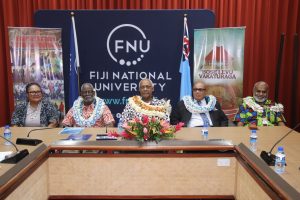

From left: Pro Vice Chancellor (Learning and Teaching) Professor Jimaima Lako, Acting Vice Chancellor Professor Nii-K Plange, GCC Chairman Ratu Viliame Seruvakula, Chancellor & Chair of FNU Council Mr Semesa Karavaki and Ministry of iTaukei Affairs PS Jone Navakamocea.
SUVA, FIJI – The Great Council of Chiefs (GCC) thanked the Fiji National University (FNU) for its pivotal role in developing the Diploma in Vanua Leadership Programme. This is a groundbreaking initiative that merges traditional leadership values with contemporary governance and development priorities.
Speaking on Friday at the Memorandum of Understanding (MoU) signing between the two institutions, GCC Chairman Ratu Viliame Seruvakula highlighted that this collaboration marks a significant investment in Fiji’s future. The programme is designed to equip iTaukei leaders with essential skills in governance, conflict resolution, environmental stewardship, and sustainable development.
“This is not just a course, it’s a transformation journey,” Ratu Viliame said.
“We are thankful to FNU for this partnership. Our chiefs must be prepared not only to protect tradition but also to navigate a rapidly changing world.”
He stressed the importance of discipline and time management in leadership, revealing that selected participants will undergo a strict daily schedule during training, starting with 5am wake-up calls.
“You cannot lead others if you cannot first manage your own time,” he said. “Before they lead their Vanua, they must first learn to lead themselves.”
Ratu Viliame also acknowledged the encouraging rise in traditional leadership appointments, from 50% to 85%, since the GCC’s revitalisation.
Leadership for a Changing Pacific
FNU Acting Vice-Chancellor Professor Nii-K Plange also delivered a compelling address, describing the urgent need for leadership that is both grounded in traditional values and capable of responding to modern threats.
“We are facing existential threats, from climate change to drug and human trafficking, and a rising HIV epidemic,” Professor Plange said. “These are foreboding signs that demand effective, competent, and decisive leadership.”
He emphasised that FNU’s commitment to the Vanua Leadership Programme stems from its responsibility to national and regional development.
“Our programme is intended to foster self-change and transformative leadership,” he added. “It seeks to critically reflect on our cultural values to decide what strengthens us, and what we must adapt, to serve future generations.”
Professor Plange said that even global frameworks such as the Sustainable Development Goals (SDGs) must be anchored in local identity.
“If traditional norms, values, and practices are weak, they will weaken the ability of governments to lead. This programme honours the concept of ‘na vanua’—a deep sense of who we are and where we come from,” he said.
The Vanua Leadership Programme is expected to become a long-term leadership development pathway for traditional leaders across Fiji.
As Ratu Viliame concluded: “This is only the beginning. We look forward to the results this initiative will yield, not just for the GCC, but for every Fijian community.”
END